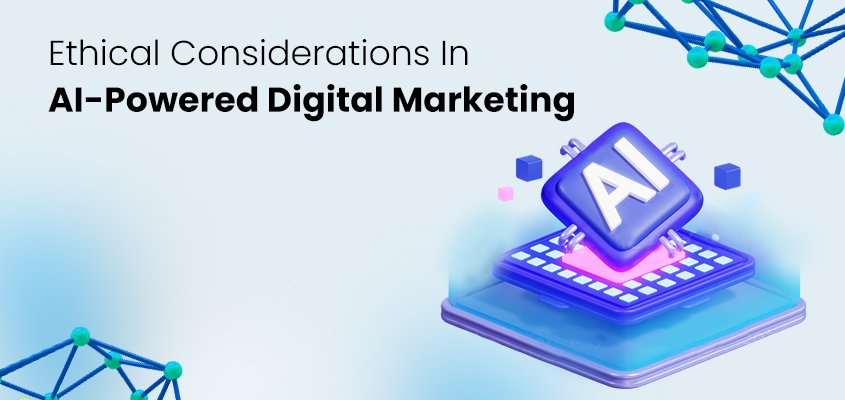Did you know that? By 2025, will AI account for 95% of all customer interactions? This shows how much AI-powered digital marketing is changing the way companies interact with people. AI helps by offering personalized content and predicting what customers might want.
However, with these benefits also come important ethical concerns. We must find the right balance between using AI to grow our companies and maintaining high ethical standards.
In this blog, we explore the ethical considerations of AI-powered digital marketing, focusing on transparency, privacy and fairness. We’ll help you understand how to responsibly use AI in your marketing efforts.
The rise of AI in digital marketing
![]()
Artificial intelligence is revolutionizing the digital marketing industry. Companies can now target their audiences with unprecedented precision. AI algorithms analyze massive amounts of data to identify patterns and predict consumer behavior.
This feature enables more personalized marketing efforts, improves user experience and increases conversion rates.
Personalization, while beneficial, raises ethical concerns around privacy and consent. Users often provide personal information without fully understanding how it will be used. Marketers need to ensure they handle this data responsibly and transparently.
Privacy concerns in AI-powered digital marketing
![]()
Data protection is a crucial ethical aspect in AI-powered digital marketing. AI’s ability to collect and analyze extensive user data increases the potential for data breaches. Therefore, marketers must prioritize user consent and data protection to build trust and avoid legal consequences.
Obtaining user consent is fundamental to ethical, AI-powered digital marketing. Companies should inform users about what data they collect, how it is used and who can access it. Transparent consent practices help build trust and ensure compliance with privacy regulations.
Once data is collected, protecting it from unauthorized access is critical. Implementing robust security measures and regularly reviewing data practices can help prevent breaches.
Marketers must also consider the ethical implications of data retention and deletion policies and ensure that user information is not retained longer than necessary.
Transparency and accountability
![]()
Transparency in AI algorithms is essential to maintaining ethical standards in digital marketing. Users should understand how their data is used and on what basis AI systems make decisions. This transparency helps build trust and enables accountability.
Explainable AI emphasizes the need for AI systems to provide understandable explanations for their decisions. In digital marketing, this means allowing users to understand why they see certain ads or recommendations. This can help address concerns about bias and discrimination in algorithmic decisions.
Also read: Does AI threaten marketing creativity? Balancing AI and human ingenuity
Avoiding bias in AI-powered digital marketing
![]()
Algorithmic bias occurs when AI systems produce biased results due to faulty data or design. Bias in AI algorithms can lead to unfair and discriminatory practices. Recognizing and mitigating these biases is critical to ensuring ethical, AI-powered digital marketing.
In digital marketing, this can lead to certain groups being unfairly targeted or excluded. Marketers should use diverse and representative data sets to mitigate bias when training AI algorithms. Regular testing and evaluation can help identify and correct biased results.
Additionally, involving diverse teams in the development and monitoring of AI systems can provide valuable perspectives and reduce the risk of bias.
Ethical use of AI in customer interactions
![]()
AI-powered digital marketing often involves direct customer interaction via chatbots and virtual assistants. Ensuring ethical practices in these interactions is critical to maintaining trust and satisfaction.
Customers should be aware that they are interacting with an AI system and not a human. Providing clear information about AI’s capabilities and limitations can help manage expectations and avoid misunderstandings.
Ethical implications of predictive analytics
![]()
Predictive analytics is a powerful tool in AI-powered digital marketing, but it raises ethical concerns about data use and privacy. Predictive analytics relies on massive amounts of data to make predictions about user behavior. Marketers must ensure that this data is used ethically and respects user privacy and consent.
While AI can improve personalization, it can feel intrusive if not handled carefully. Marketers should strive to find a balance between providing valuable recommendations and respecting user limitations. Regular feedback from users can help fine-tune these practices.
The role of regulations and standards
![]()
Regulation and industry standards are critical to ensuring ethical AI-powered digital marketing practices. Compliance with these standards helps protect users and promotes responsible use of AI.
Legal regulations Providing data protection and privacy policies. Marketers must comply with these regulations to ensure ethical practices and avoid legal consequences.
Additionally, industry standards can provide additional guidance for ethical, AI-powered digital marketing. Collaboration between industry leaders, policymakers and stakeholders can help develop these standards and promote responsible use of AI.
About Us
Reach First is a full-service digital marketing agency dedicated to providing innovative and ethical marketing solutions. Our expertise in AI-powered digital marketing helps companies effectively engage with their audiences while maintaining high ethical standards.
Contact us for more information or to discuss your marketing needs.

